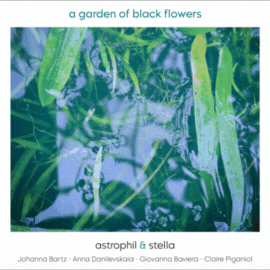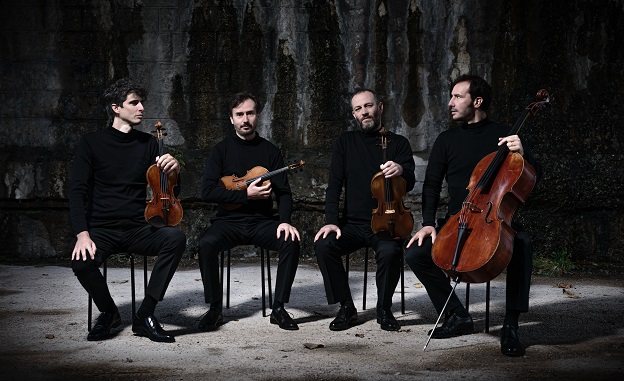Why has a French quartet decided to publish a complete set of Benjamin Britten’s quartets?
It’s true that while English musicians have been playing Britten’s music since the Conservatoire, his chamber music is virtually unknown in France; we hear little more than his operas and even Christmas Carols, the jewel in the crown of the children’s choir repertoire. It’s rare for true masterpieces to fly under the radar, but I think that’s the case with Britten’s string quartets!
Unlike Shostakovich’s quartets, Britten’s don’t have any external attachment, they’re abstract. Is this a difficulty for interpretation or perhaps an advantage?
I don’t think the abstraction of the music is a disadvantage for interpretation. Maybe it makes it more challenging to listen to? But Britten’s music, though sophisticated, is not intellectual; it speaks very directly to the heart. Moreover, the re-reading of English Baroque in the 2nd quartet, or the atmosphere of Venetian twilight in the 3rd, are possible points of entry into this music…
 How do Britten’s quartets differ from those of other composers? Where do they fit into the history of music?
How do Britten’s quartets differ from those of other composers? Where do they fit into the history of music?
You compare Britten’s quartets to those of Shostakovich in your previous question, and that’s very apt. I think the two works are sisters in their poetic philosophy.
Even though the styles are very different (and the temperaments of the two men are certainly the same), we find in both the desire to seize the musical past, our common Western culture, to create music that can speak to everyone immediately. But by playing with the conventions of tonal language, by surprising and provoking, by shifting, exoticism and « off-roading, » a whole range of emotions from humor to despair, from melancholy to the most luminous joy, the work of these two composers is eminently expressive.
For us in the Béla Quartet, the music of the twentieth century is deeply moving because of the revolutions in language and the exploratory heights it has traversed. We are very attached to the forward-looking qualities of the pieces we work on, from Bartok to Xenakis, via Berg or Lachenmann. Britten can be seen as a reactionary composer compared to the great figures of modernism. But, of course, experimentation is not a prerequisite for « good » music. Britten has chosen not to abandon our musical roots. He questions their limits, he plays with them, and he patiently cultivates the garden of his own language, allowing the trees he planted in his youth to flourish. He is a passionate, exciting musician who places his art at the highest level of spirituality…what more can we say?
Britten himself was a string player, a violist of the highest caliber. Is that reflected in the quartets?
Britten was first and foremost a great pianist (listen to his recordings with Rostropovich!), but his viola playing was a great advantage in writing his quartets. The parts are perfectly conceived for the instruments of the quartet, and the sometimes very difficult things (ah! the second movement of the 2nd quartet…) are always playable and, in the end, played with good instrumental sense! And above all, his scores radiate a love for string instruments that is very moving for us performers!
Why did you decide to arrange Illuminations for string quartet?
The Illuminations, originally written for string orchestra and soprano or tenor, reflect the same knowledge and love of our instruments that I mentioned earlier. As for Britten’s love of the sung voice and text, I think his moving operas speak for themselves. Here Britten’s art makes an extraordinary incursion into the French language. And what a language it is, that of Rimbaud. We had an old concert memory from the Nuits d’Eté Festival (the festival founded by our violist Julian Boutin), of performing these Illuminations in orchestra with Julia Wischnievski. The rich dialog between the instrumental and vocal parts, Julia’s rich voice and infallible technique convinced us to revive this work… with our quartet resources! Britten understood Rimbaud’s delirious synesthesia and sublimated it in his music.
What was the major challenge in this work?
The jagged, sharp quality of the string parts, their presence alongside the voice, convinced us that a reduced quartet version could work. What remained was not to lose the fullness and polyphonic richness of the orchestra. We had to write certain passages in double strings, which were technically very difficult, and which I wouldn’t have dared propose to musicians other than my quartet mates! We even resorted to a downward chord change on the cello to catch an essential double bass note in Being Beauteous. And then, as in any reduction (and indeed in any compositional work), the hardest thing to do: give up. Giving up certain notes, sometimes an entire voice, so as not to lose the overall momentum.
Your quartet was founded in 2006. Do you feel you’ve achieved what you set out to do back then?
When you embark on an undertaking like a string quartet, the goal is always a point on the horizon. The new goal then becomes: don’t lose that point on the horizon, don’t lose the desire or the courage to strive towards it. We have always placed musical creation at the heart of our activity, and the numerous commissions we have received bear witness to this. Transmission is also essential to us, and we strive to reach out to the youngest members of our audience, getting them on stage with us, or creating shows with an educational or popularizing purpose. In this sense, we’ve remained fairly faithful to what we wanted to do from the outset, even if the journey has curved our choices in one artistic direction or another.
Could you explain the Quatuor Béla’s rehearsal process? What’s important to you?
We rehearse in concentrated sessions over several days, giving ourselves plenty of time for personal work…and personal life! Some of us have other activities such as teaching, composing, circus or theater, and we believe in the mutual enrichment of these various practices. We take care of our desire to play together. As with all quartets, our work is patient and meticulous, and every detail of positioning, intonation and balance is gradually integrated. Musical choices are discussed and decided collegially, which takes time but justifies our practice, which would otherwise be of little value. It gives us immense pleasure to defend the classical repertoire as best we can, just as well as our predecessors did, while respecting our own vision as performers. But bringing new works into the world, untouched by tradition, is perhaps an even greater thrill, combining the excitement of discovery with the pride of sharing it with the public! In this way, we pass on our musical baggage, which has been with us since childhood, and our discoveries, the fruits picked along the way, which give meaning to our profession as musicians.


























